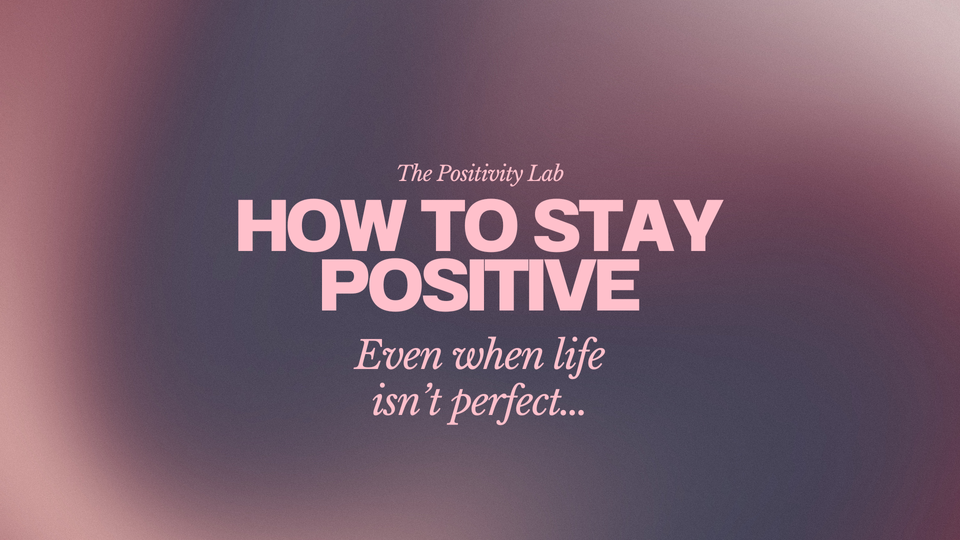The Positivity Lab: How To Stay Positive. Even when life isn't perfect...

Let’s be real—life throws challenges our way. But what if you could change how you respond? Positivity doesn’t mean pretending everything’s perfect, but it does mean building mental resilience. And the good news? You can train your brain to focus on the good!
Here’s a look at some actionable, science-backed tips you can try daily:
- Savoring Positive Experiences: taking just 15-20 seconds to focus on a positive moment helps form new neural pathways. It’s like installing “software” in your brain that fights negativity bias.
- Cortisol Control: stress spikes cortisol, the body’s stress hormone. But neuroscience shows that deep breathing activates the vagus nerve, calming the brain and reducing cortisol in minutes.
- Reframing Stress: viewing stress as a challenge rather than a threat boosts mental performance. Asking yourself, "What can I learn from this?" shifts your brain into growth mode.
- Neuroplasticity & Movement: Physical activity doesn’t just boost mood through endorphins—it promotes neuroplasticity, enhancing brain function and emotional resilience. Even a quick 10-minute walk can create this effect.
These aren’t feel-good mantras. These are proven methods to help you retrain your brain and take control of your emotional well-being. Want to go deeper?
If you’re ready to make small changes that lead to a big shift in how you feel, join my 10-day Positivity Challenge! Every day, I’ll send you one actionable tip that’s easy to implement and backed by science. Ready to feel more positive?
[Sign up here for the 10-day Positivity Challenge]

When people think of positivity, they often imagine someone who’s constantly happy, always smiling, and never troubled by life’s challenges. But the truth is, being positive isn’t about being happy all the time. It’s about mindset—choosing to focus on what you can control, seeing the silver lining in difficult situations, and understanding that every challenge is a lesson.
What is Positivity, Really?
Positivity, in the scientific sense, doesn’t mean ignoring the negative or pretending life is perfect. It’s about building mental resilience—the ability to bounce back from setbacks and keep going. In fact, Dr. Barbara Fredrickson, a leading psychologist at the University of North Carolina, found that experiencing positive emotions broadens our minds and helps us build lasting emotional resources.
Fredrickson's Broaden-and-Build Theory shows that positivity helps us develop skills and resilience over time. When we feel positive, our brains actually become more creative, open to learning, and able to tackle challenges. These positive emotions help us form social connections, solve problems, and even improve physical health.

The Neuroscience of Positivity
The brain is wired to focus on negative experiences as a survival mechanism—a concept known as the negativity bias. This bias helped our ancestors avoid danger, but it can leave us focusing too much on life’s challenges in modern times. Luckily, neuroscience has shown that we can counteract this bias through intentional effort.
Recent studies show that practicing gratitude, mindfulness, and positive reframing can actually rewire the brain. Dr. Rick Hanson, a neuropsychologist and author of Hardwiring Happiness, has extensively studied how people can "train" their brains to hold onto positive experiences. Hanson’s research shows that we need to savor good moments for at least 15-20 seconds to build new neural connections. By focusing on positive experiences, we help the brain shift from its default negativity to a more balanced, positive perspective.
Why Positivity Doesn’t Mean Being Happy All the Time
It’s important to remember that positivity doesn’t mean forcing yourself to be happy every day. In fact, it’s entirely natural to experience a full range of emotions—stress, frustration, sadness—especially when life gets tough. What sets positive people apart is how they respond to these emotions.
Research by Dr. Sonja Lyubomirsky, a psychologist at the University of California, Riverside, suggests that only 50% of our happiness is determined by genetics. The other half is influenced by our actions, mindset, and circumstances. That means we have a significant amount of control over how we perceive and respond to the challenges we face.
One of the best ways to stay positive when life gets tough is to focus on growth. Every experience, no matter how difficult, can teach us something valuable. As Viktor Frankl, a Holocaust survivor and psychiatrist, wrote in his famous book Man’s Search for Meaning,
“When we are no longer able to change a situation, we are challenged to change ourselves.”
Positivity, then, is about seeing these challenges as opportunities to grow.

The Benefits of Positivity
Why should you bother with positivity, especially when life feels overwhelming? Because the benefits are huge—not just for your mental health, but for your physical well-being too.
- Improved Health: Research from Johns Hopkins University highlights a significant link between a positive outlook and a reduced risk of cardiac events. A study led by Lisa R. Yanek, published in the American Journal of Cardiology, found that individuals with a cheerful disposition had a one-third lower risk of serious heart issues over an extended follow-up period. For those already at risk for coronary problems, this reduction was nearly 50%.*
- Enhanced Mental Performance: Research indicates that positive thinking can enhance cognitive flexibility, enabling individuals to approach problems from various angles and find innovative solutions.
Additionally, a more recent study by Teresa M. Amabile emphasized the link between positive emotions and creativity in the workplace, suggesting that fostering a positive emotional environment can lead to improved performance and innovative thinking. - Better Social Connections: Dr. Barbara Fredrickson’s research on positive emotions indicates that positivity boosts our capacity to connect with others. In a study published in the journal Emotion, Fredrickson found that positive emotions enhance relationship-building and support systems, which are crucial for overall mental health.

Building Positivity - Easy Habits for Daily Life
Now that you understand how powerful positivity can be, how can you start building it into your life? With small, intentional shifts, you can actually train your brain to create lasting mental resilience. This isn’t just about “good vibes” or “mindfulness.” It’s about real, proven techniques that change how your brain responds to stress.
Here’s a look at some actionable, science-backed tips you can try daily:
- Savoring Positive Experiences: taking just 15-20 seconds to focus on a positive moment helps form new neural pathways. It’s like installing “software” in your brain that fights negativity bias.
- Cortisol Control: stress spikes cortisol, the body’s stress hormone. But neuroscience shows that deep breathing activates the vagus nerve, calming the brain and reducing cortisol in minutes.
- Reframing Stress: viewing stress as a challenge rather than a threat boosts mental performance. Asking yourself, "What can I learn from this?" shifts your brain into growth mode.
- Neuroplasticity & Movement: Physical activity doesn’t just boost mood through endorphins—it promotes neuroplasticity, enhancing brain function and emotional resilience. Even a quick 10-minute walk can create this effect.
Join My 10-Day Positivity Challenge
If you’re ready to start building positivity into your life, I’ve created a free 10-day challenge to help you get started. Each day, I’ll send you a short, actionable tip—backed by science—that you can apply to your daily routine. Whether you’re having a great day or a tough one, these habits will help you shift your mindset and build long-term resilience.
[Sign up here for the 10-day Positivity Challenge]
Remember, positivity isn’t about perfection—it’s about progress. Life will always bring ups and downs, but with the right mindset, you can learn to see the good, even in the hard moments.
Let’s start this journey together!

Comments ()